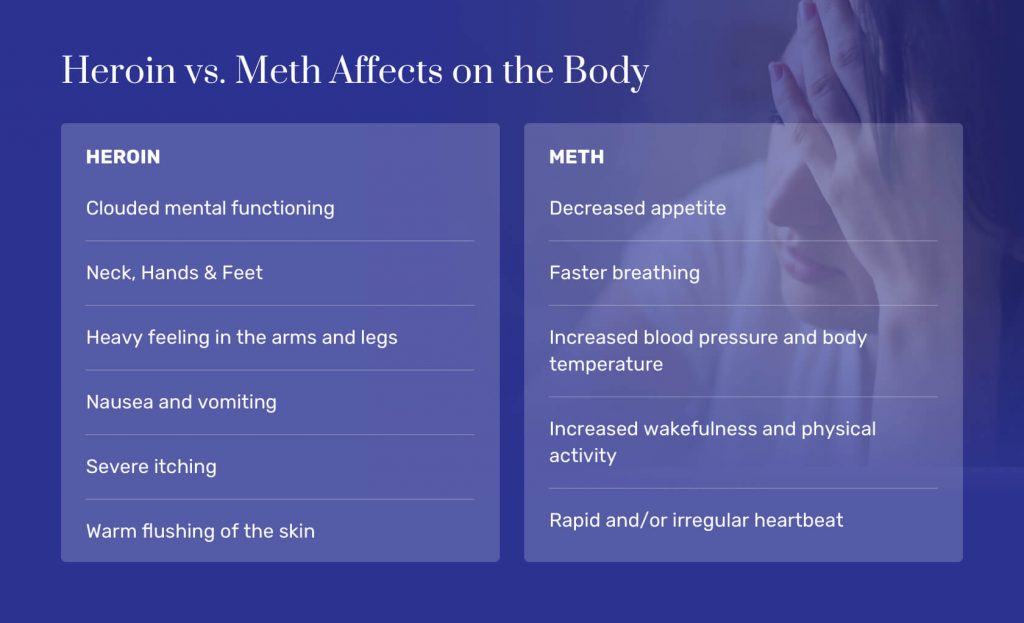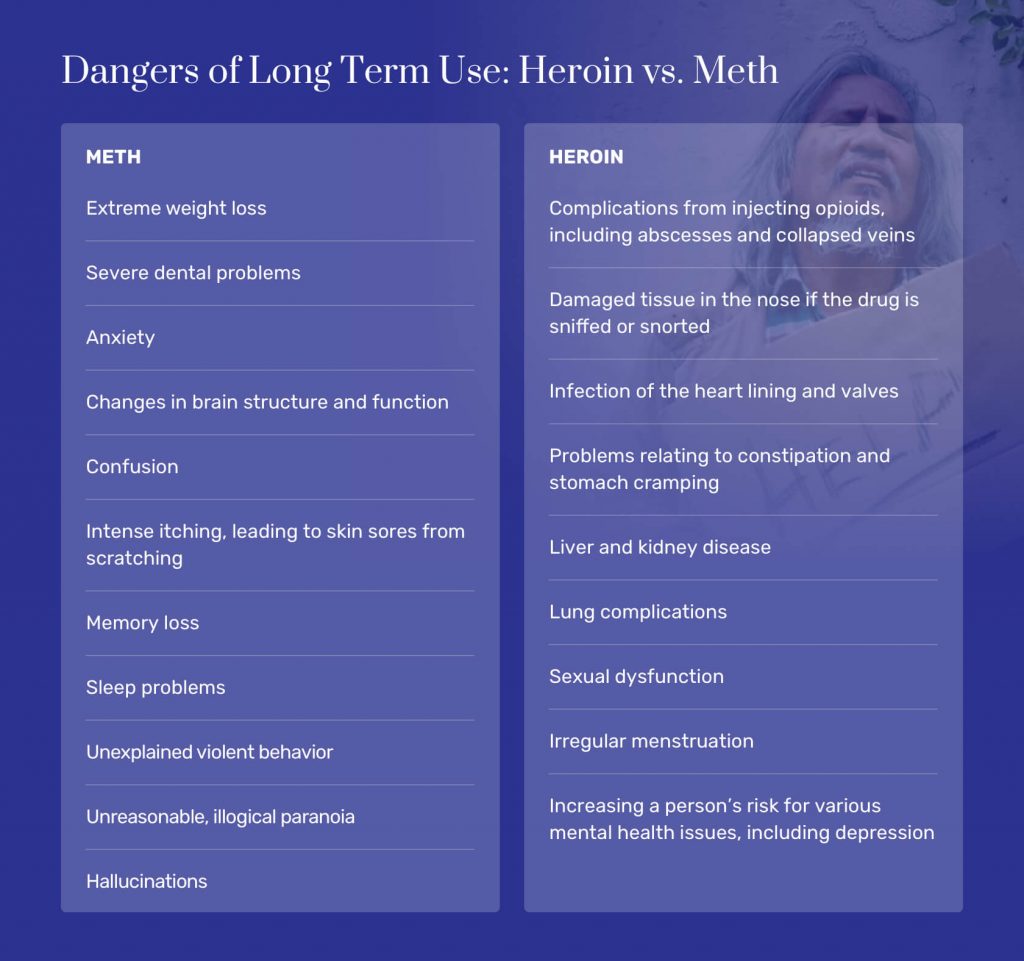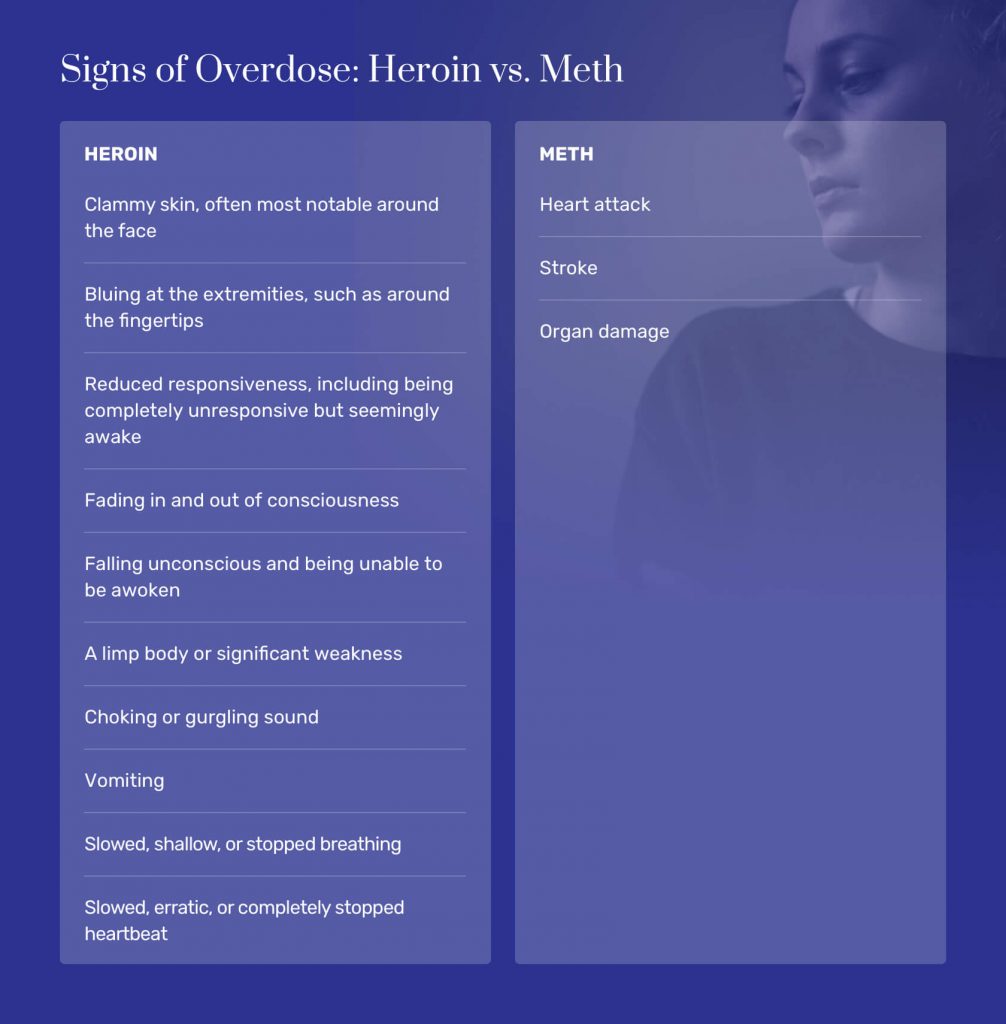Heroin and meth are two very destructive drugs, with significant abuse and addiction potential. While they share similarities in terms of their addictive potential and the harm they can cause, they also differ in substantial ways.
Heroin vs. Meth: Breaking Down Both Drugs
While sometimes used in combination, heroin and methamphetamines (often just called meth) are two distinct drugs that affect the body in different ways.

How They Affect the Mind & Body
Heroin is a short-acting opioid, a type of drug that binds to opioid receptors in the brain, causing its effects. Heroin is associated with causing a “rush,” a short, intense euphoric high, followed by a period of often very unfocused calm where a person fades in and out of coherence and consciousness.
Heroin use has some other side effects associated with it, including these:
- Clouded mental functioning
- Dry mouth
- Heavy feeling in the arms and legs
- Nausea and vomiting
- Severe itching
- Warm flushing of the skin
Methamphetamine is a type of powerful stimulant, the same class of drug that caffeine is in but much more potent and dangerous. Meth increases the amount of dopamine in the brain, which is involved in a number of important functions, including body movement and the brain’s reward systems. This is part of what makes the drug so addictive.
Meth use is associated with a number of short-term effects, including these:
- Decreased appetite
- Faster breathing
- Increased blood pressure and body temperature
- Increased wakefulness and physical activity
- Rapid and/or irregular heartbeat
Addiction
Comparing which drug of two drugs is “more” addictive can be difficult, as a variety of factors can affect what makes a person at risk of becoming addicted to a drug, and these two drugs have different mechanisms of action. While more people die each year of a heroin-related overdose than a methamphetamine-related overdose, trying to determine which drug is most addictive becomes arguably irrelevant at a certain point.
Both drugs can cause a serious problem with addiction that will likely require the help of an addiction treatment professional to begin recovering from. Neither drug is considered “safer” or less addictive than the other.

Dangers to Note
Beyond the risk of addiction noted above, both these drugs can be seriously detrimental to a person’s health if used for a prolonged period. They can also both cause a life-threatening overdose, discussed more in a later section.
Long-term opioid use, including heroin use, can cause many different health problems, with the following being some of the most common:
- Complications from injecting opioids, including abscesses and collapsed veins
- Damaged tissue in the nose if the drug is sniffed or snorted
- Infection of the heart lining and valves
- Problems relating to constipation and stomach cramping
- Liver and kidney disease
- Lung complications
- Sexual dysfunction
- Irregular menstruation
- Increasing a person’s risk for various mental health issues, including depression
Long-term methamphetamine use is associated with different but still very serious health problems, including these:
- Extreme weight loss
- Severe dental problems
- Anxiety
- Changes in brain structure and function
- Confusion
- Intense itching, leading to skin sores from scratching
- Memory loss
- Sleep problems
- Unexplained violent behavior
- Unreasonable, illogical paranoia
- Hallucinations
Key Facts About Heroin & Meth
The following are some key facts and figures about heroin and meth:
| Heroin | Methamphetamine |
| About 500,000 in the United States are dependent on heroin, with over 3,000,000 people in the country suffering from opioid use disorder (OUD). | An estimated 1.5 million people living in the United States reported having a methamphetamine use disorder in the prior 12 months, according to a 2020 survey. |
| In 2020, an estimated 13,165 people died in this country of an overdose involving heroin. | In 2020, an estimated 23,837 people died in this country from an overdose related to a psychostimulant other than cocaine, primarily dying due to methamphetamine use. |
| About 68 percent of heroin overdoses also involved the use of synthetic opioids. | Half of methamphetamine overdose deaths also involve an opioid, usually fentanyl, but some of these deaths can include heroin use as a contributing factor. |
| Approximately 70 percent of opioid-related overdose deaths occurred among men. | Nearly 1 percent of people reported in the survey noted above that they used methamphetamine within the prior month. |
Overdose & Withdrawal
High doses of opioids, including heroin, can cause a life-threatening depression of a person’s breathing. Their breathing may become so weak that they don’t pull in enough air to support their brain, or they may even stop breathing. This can cause a person to enter a coma, develop permanent brain damage, and potentially die.

Signs of this overdose include the following:
- Clammy skin, often most notable around the face
- Bluing at the extremities, such as around the fingertips
- Reduced responsiveness, including being completely unresponsive but seemingly awake
- Fading in and out of consciousness
- Falling unconscious and being unable to be awoken
- A limp body or significant weakness
- Choking or gurgling sound
- Vomiting
- Slowed, shallow, or stopped breathing
- Slowed, erratic, or completely stopped heartbeat
Opioid withdrawal is notoriously difficult, producing symptoms often described as flu-like. While not usually life-threatening, these can be very uncomfortable and make quitting once dependent more difficult:
- Cold flashes with goosebumps
- Difficulty sleeping
- Diarrhea and vomiting
- Heavy sweating
- Restlessness
- Severe muscle and bone pain
- Severe drug cravings
As a powerful stimulant, a meth overdose can cause serious problems, usually related to the heart. Some ways a meth overdose can manifest include the following:
- Heart attack
- Stroke
- Organ damage
Once a person has grown dependent, meth withdrawal can also be difficult, causing symptoms such as these:
- Anxiety
- Depression
- Fatigue
- Psychosis (a break from reality)
- Intense drug cravings
If you suspect a person is overdosing on either substance, it is a medical emergency, and you should call 911. In the event of a heroin overdose, naloxone can help reverse an overdose and should be administered immediately if available.
Addiction Treatment & How It Differs for Heroin vs. Meth
The primary recommended treatment for both types of addiction is cognitive behavioral therapy. This is a type of therapy that is very helpful for addressing addiction, as it involves a person working with a mental health professional to better understand their own mind and thought processes. You will try to identify what thoughts may lead you to drug use or trigger drug cravings. Then, you learn how to better channel those thoughts when they occur and even avoid them completely when possible.
There are no medications currently approved to help treat a methamphetamine addiction, although there has been research into some interesting supplemental treatment options that can improve recovery results. One of the more interesting is the use of incentives, where patients can earn prizes, sometimes even small cash rewards, for periods of abstinence and meeting other productive milestones.
There are several medications approved for use as part of medication-assisted treatment (MAT) for opioid use disorder, including methadone and buprenorphine. MAT involves the use of medication to improve recovery results. In the case of methadone and buprenorphine (with buprenorphine usually combined with naloxone, such as in the drug Suboxone), these medications can be used to suppress withdrawal symptoms and eliminate or greatly reduce drug cravings.
MAT is often considered the ideal treatment for heroin addiction since it combines medications and therapy. As the medication keeps withdrawal and cravings at bay, people are able to focus on the work done in therapy, building a strong foundation in recovery.
- Heroin DrugFacts. (December 2022). National Institute on Drug Abuse.
- Methamphetamine DrugFacts. (May 2019). National Institute on Drug Abuse.
- Understanding Drug Use and Addiction DrugFacts. (June 2018). National Institute on Drug Abuse.
- Opioid Addiction. (September 2022). StatPearls.
- Overdose Death Rates. (January 2022). National Institute on Drug Abuse.
- What Is the Scope of Methamphetamine Use in the United States? (October 2019). National Institute on Drug Abuse.
- What Are the Treatments for Heroin Use Disorder? (June 2018). National Institute on Drug Abuse.
- Reciprocal Substitution Between Methamphetamine and Heroin in Terms of Reinforcement Effects in Rats. (July 2020). Frontiers in Psychiatry.
- Contrasting Trajectories of Heroin, Cocaine, and Methamphetamine Use. (February 2010). Journal of Addictive Diseases.
- Association of Methamphetamine and Opioid Use With Nonfatal Overdose in Rural Communities. (August 2022). JAMA.
- Pharmacological Approaches to Methamphetamine Dependence: A Focused Review. (June 2010). British Journal of Clinical Pharmacology.
- Combination Treatment for Methamphetamine Use Disorder Shows Promise in NIH Study. (January 2021). National Institutes of Health.



